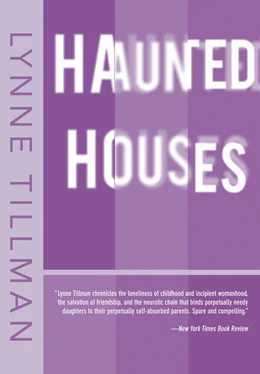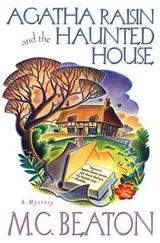The other’s position was somehow more advantageous. Emily was an only child, envied by Christine, who had a younger brother, who was envied by Emily, who felt deprived of a real family. One had money, the other didn’t. One had a living father, the other didn’t. Together they dissected the minutiae of their lives, often stressing their similarities or muting their differences to make them seem more like likenesses. People called each by the other’s name, even though they didn’t look alike, and Christine more than Emily found it disturbing. It was as if, in Christine’s eyes, Emily was doing something to make that happen. On the other hand, Christine was more successful with men, and when they were out together Emily found herself receding to the back of the booth. She’s more beautiful than I am, Emily concluded sadly, and was angry at Christine involuntarily. But men were supposed to occupy a separate, defined space that did not intrude upon their friendship. The day turned into evening and the evening, night, and the best friends talked and talked. Why, Emily wondered, had love taken the form it did. Why had dying for love become one of the conventions. And was it really necessary to suffer a broken heart. When had we learned to. Even suffering, crying, sounds different in different countries and we react to pain with different sounds when we speak different languages.
Edith watched their relationship like a mother cat who is no longer feeding her kittens. She knew trouble when she saw it, but there was no way, hardly even the words with which to broach the subject with Emily, who was more sensitive than she had ever been. Allowed to be more sensitive. For certainly if Edith had grown up in a household where there had been more money, she might have been gentler, she thought. In a way that Edith couldn’t fathom, Emily could sense her, knew when to avoid her, or knew how to talk with her when she didn’t want anyone near her. The quality was remarkable, but there was no future in being sensitive, no future in poetry, or even in prophecy. But children — and Emily was still a child — didn’t think about the future and money, especially Emily, whose father, a lawyer, kept her allowance coming despite any problems he or her mother might have about the way Emily dressed or the people she saw. Probably Ethical Culture — had she said he was a Quaker — Edith thought as she stacked the toilet paper in the utility closet, which took up half the shelf space, but such a bargain and now she wouldn’t have to think about toilet paper for half a year at least. Unless she threw a lot of dinner parties, but she didn’t imagine she would.
The sun came through Emily’s bathroom window and cast light on her face and his. He was sleeping on the floor, on a thin sheet of foam rubber he called his pallet, his bed when he was with her. His guitar was under her bed. When she opened her eyes she saw his black underpants. Bikinis. He slept with his back toward her, his long body below her like a rug of flesh. She’d missed another sixteenth-century poetry class. She grabbed her robe to cover herself. He walked around naked in front of her. Christine said he was a tease. But she hated him anyway. His body. She told herself she didn’t care. Love isn’t like this. She kicked him in the ass. If your people hadn’t left England we might not all want to be famous.
The child educator called on Edith just often enough to satisfy something, but she would never again consider marriage. She admitted to herself that she was comfortable with her life, not content; there were longings. But she liked waking up and going out and answering to no one. There was a way in which feeling loss kept her husband with her, and she didn’t want to give him up. Loss had a shape, a presence she didn’t have to share with anyone. When you get older you don’t want to have to share with anyone. She could be as selfish as she wanted. She walked around the apartment, turning off the lights. All those anymores. Could she raise Emily’s rent two dollars a week to keep up with the electric bills? It’s still a good idea. Edith ran her fingers through her short thick hair. It had never curled when she was a child and now she wore it as she liked it, close to her head, the shape of which she was proud. Her hair was convenient. Like having a woman in to clean the apartment once a week, something she hadn’t done when her husband was alive. Hiring the black woman caused her conflict. Hadn’t she marched for civil rights as early as the forties. Shouldn’t she hire a white woman, but the state employment agency sent her Helen, who was about her age, and Helen needed the work. And why should Edith stand on principle when to do so meant denying this woman a source of income, and by now they’d been together, she and Helen, six years, and how could she have fixed the world by not hiring her. Edith sighed audibly in the empty apartment and left a note for Helen — her son had been sick, maybe heroin, but Edith didn’t ask — and ran her hands once more through her hair. A trace of lipstick still on her lips, she added some more orange and smiled at herself, as if pleased not with her image but with something else that was not pictured.
Helen and Emily met in the kitchen and had some coffee that Edith had left for Helen. Or maybe it was just left over. Helen asked Emily how her poems and painting were going and Emily asked Helen about her son. Emily wondered if Helen really liked Edith, if she could really like her. Not wanting Helen to see Keith lying on the floor, she walked backward into the room, blocking the door as she talked, almost stepping on his head. Helen wanted one of Emily’s paintings and Emily was touched. Helen laughed about it later, Emily walking backward, hiding her guy. White people were so funny. Her son got angry when she said funny. When Helen brought home the painting she’d asked Emily for, to go over the couch, her son walked out of the apartment.
Or so Emily imagined it. Gazing into a mirror, absentmindedly plucking her eyebrows, the disorder on her brow, Emily removed as much of the present as she could. The piano teacher is sitting beside her now on the soft chair she liked so much, her clothes like a garden that needs tending. Full of color and the smell of violets, Hilda’s mouth is slightly open and she is smiling as Emily plays, not too badly, a Bach exercise. As Emily finishes the piece without a mistake, Hilda is almost triumphant. No mistakes. The forest across the street appears, seen again as it was during every lesson. With longing. Her own eyebrows and Hilda’s clothes now resonant of Richard II with those gardening metaphors for bad governing. No mistakes. We can’t make any mistakes. How can I avoid them? Her eyes close and Hilda fades reluctantly and again she wonders where she is right now and.
Remember walking on the sidewalk and jumping over the cracks, and if you lose your balance, if you step on one, something terrible will happen to you. Walking a fine line invisible to anyone but herself, Jane dropped out of college and got a job at Macy’s, in the toy department, where she expected never to see anyone she knew. She was living with her sister again, eating whole wheat donuts for lunch and finishing boxes of chocolate cookies for dinner. Home was a room that was too empty. The chair was uncomfortable. The air smelled bad, like a new apartment, although it wasn’t. The shower didn’t have enough pressure. Next door an alcoholic couple screamed into the night. Jane watched television and wrote in her diary.
If I loved somebody I wouldn’t feel like this. Or if somebody loved me. Sometimes I feel there’s no difference between my body and this chair I’m sitting in. In a funny way I don’t think I exist. Not really. Things just seem to go on and on, with and without me, mostly without me.
Читать дальше












